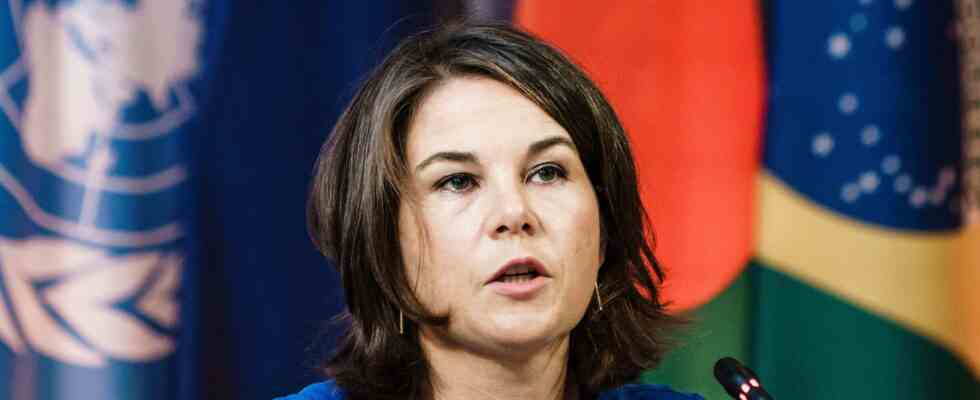Status: 07/18/2022 10:06 a.m
At the start of the Petersberg climate dialogue, Foreign Minister Baerbock warned of the consequences of the climate crisis. It is about “the greatest security risk for all people”. That’s why “the answers shouldn’t stop at any border”.
Foreign Minister Annalena Baerbock has called on partner states to join forces and step up efforts to combat man-made global warming. “The climate crisis is now the biggest security problem for everyone on earth,” said the Green politician in Berlin before the start of the Petersberg climate dialogue. “The climate crisis doesn’t stop at any border. That’s why the answers shouldn’t stop at any border,” said Baerbock.
“Biggest security threat of this century”
The aim is to “be able to contain the greatest security threat of this century” together and internationally. The Petersberg climate dialogue is a central building block in paving the way for a successful world climate conference COP27 in November this year in Egypt. “We’re all in the same boat, which means we can only turn things around together,” said Baerbock.
Baerbock referred to the threatening development caused by global warming in Africa, but also to the devastating fires of the past few weeks in southern Europe and the flood disaster last year in the Ahr Valley. “We have to step up our joint efforts,” she said.
Germany must redouble its efforts
According to Foreign Minister Annalena Baerbock, Germany will not make any compromises in terms of climate protection because of the Ukraine war and the resulting energy crisis. Germany must reactivate coal-fired power plants for a short period of time – “but only as an emergency reserve,” Baerbock emphasized at the conference in the Federal Foreign Office. “But it does not mean that we are giving up our 1.5 degree target.” Germany must redouble its efforts.
Baerbock said there were eight years left to cut global emissions of greenhouse gases in half. She demanded that the industrialized countries, as those primarily responsible for previous CO2 emissions, finally have to implement their commitments to provide poorer countries with 100 billion euros a year for climate finance. “The industrialized countries have a special responsibility.”
Climate insurance for poor countries
She again campaigned for a global climate risk protection umbrella. This is a program for climate risk insurance that compensates for damage caused by storms and floods, for example. “We have to recognize that there is climate damage and that the most vulnerable countries in particular need our solidarity to deal with it,” said State Secretary for Development Jochen Flasbarth.
The spokeswoman for the board of directors of the German Society for International Cooperation (GIZ), Tanja Gönner, also said that the climate crisis “acts like a fire accelerator” especially in fragile regions and contexts. “People have to leave their homes, conflicts arise or escalate.” It is therefore crucial that poorer countries receive funds to adapt to climate change.
Review by Fridays for Future
Climate activist Luisa Neubauer sharply criticized Olaf Scholz before the start of the event and described him as a “fossil chancellor”. Scholz must now present a plan on how to protect people from the climate crisis and financially support the global south, said Neubauer from the environmental movement Fridays for Future of the “Rheinische Post”. “For the first seven months of his chancellorship, Olaf Scholz was not a climate chancellor, but a fossil chancellor – new gas production in Senegal, a fossil G7 summit, new fossil energy contracts. That’s dramatic.”
“We’re all in the same boat”: Baerbock opens the Petersberg climate dialogue
Markus Sambale, ARD Berlin, 18.7.2022 10:22 a.m

